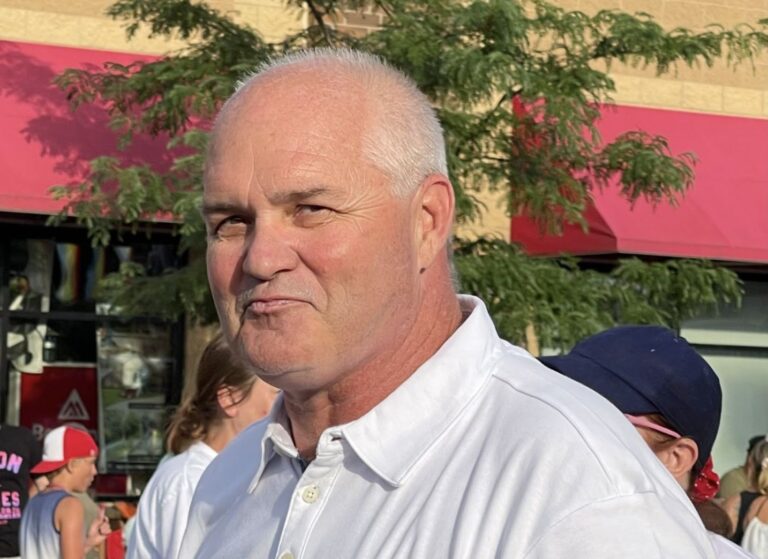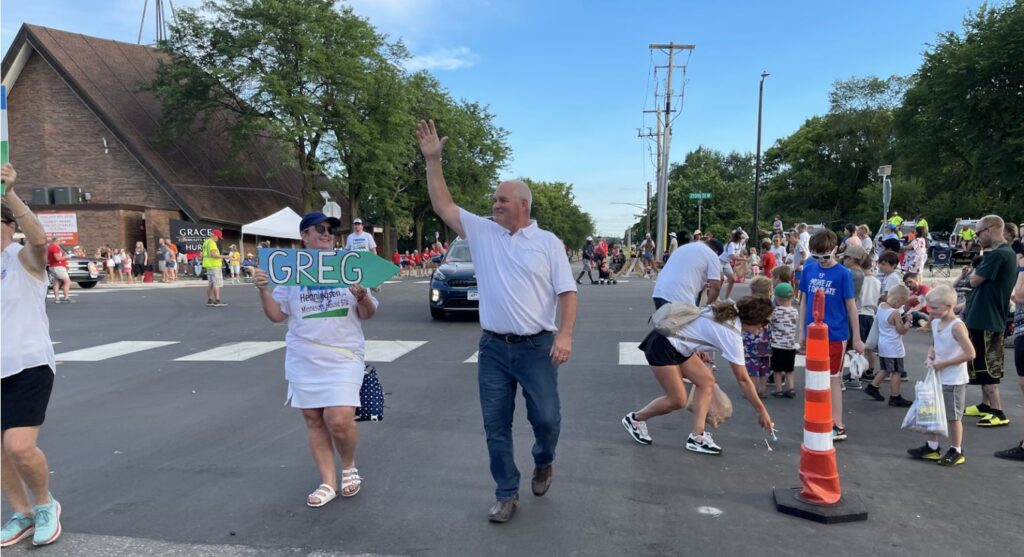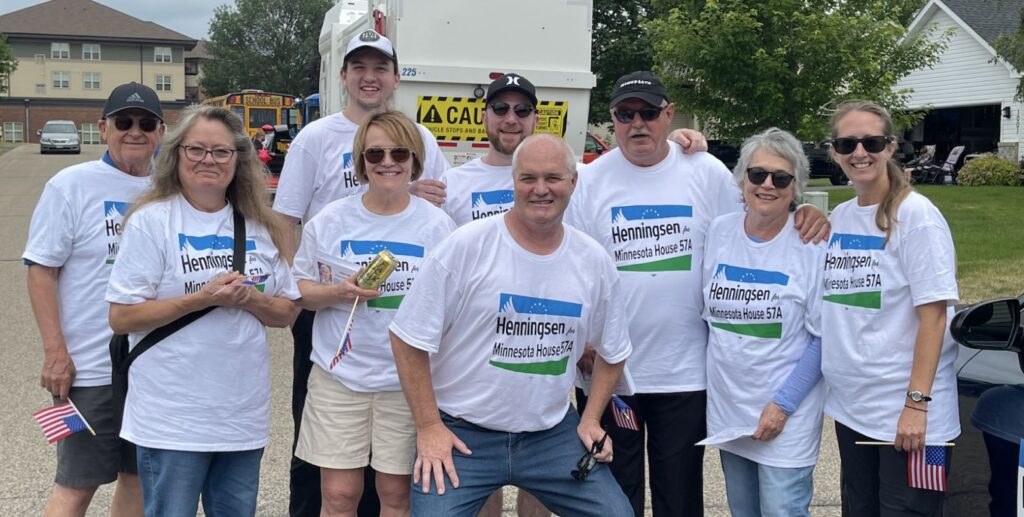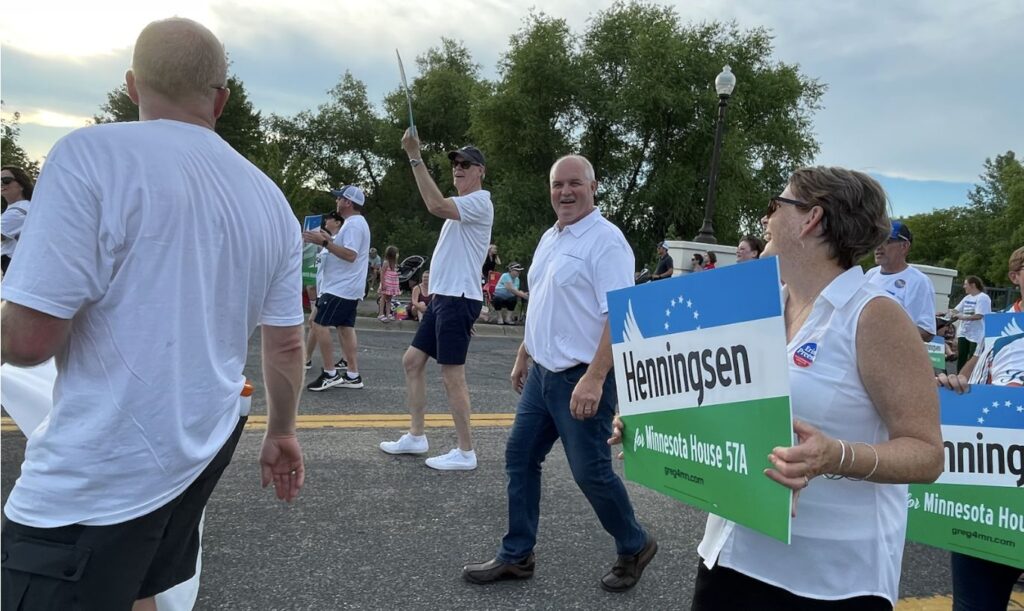Greg Henningsen walked into his local Senate convention as a first-time delegate. In a matter of hours, he was – much to his surprise – nominated and endorsed to be a candidate in an election for the Minnesota House of Representatives. There, he was set up with a team of four to run his campaign. By the following month, they had all resigned.
Greg never dreamed of running for office. “I’m a construction worker,” he said. “I’m not a politician at all.” But the divisive political climate motivated him to get involved and become a delegate. “Politics seem to be as bad as they’ve been in my life and I’m at a point where I have the time to do this,” he said. “Those two things collided and there I was.”
Prior to the convention, he had only just begun engaging in politics by participating in a relational organizing training and doing some volunteer work for a school board candidate. But after Minnesota was redistricted, and his area became a Republican stronghold, the Democratic-Farmer-Labor (DFL) Party – Minnesota’s equivalent to the Democratic Party – needed a candidate to run. At the convention, they asked Greg if he would do it. “I had to work my way through disbelief,” he said. But he was up for the challenge.
After being nominated, one of his first calls was to Rick Hotchner, a Red in Braver Angels who Greg refers to as a “mentor” despite their differing political perspectives. Through Rick, Greg learned about Braver Politics – Braver Angels’ initiative to depolarize politics and rebuild it on a foundation of trust, citizenship, and good-will. Rick’s objective was to help Greg share the Braver Angels message and model his campaign in this spirit, so he encouraged Greg to sign the Pledge for Civility drafted by Braver Angels leaders in Minnesota. By signing it, candidates are required to: focus on their own campaigns, avoid exaggerated disagreement and personal attacks, treat all citizens with respect, prioritize people over interest groups, extend good will and conciliation to their opponent and those who did not vote for them, recommit to these principles should they fail, and forgive others when they fall short of these standards
Running for office would be his opportunity to show people how to make politics about “relationship building and doing government in a different way.”

From that point on, it was clear Greg wouldn’t be a typical candidate. His focus wasn’t on relentlessly pushing his party’s platform or disparaging his opponent. Instead, he had another message: Politics don’t have to be so polarized. Running for office would be his opportunity to show people how to make politics about “relationship building and doing government in a different way,” he said.
Greg first tested his message in an unexpected area: “I went to Trump country.” There, on a beautiful spring Saturday, in one of the most rural areas in his district, Greg knocked on door after door. “I was having great conversations with people who would never vote for a Democrat,” he said. But whether or not he won them over wasn’t the point. “I was there to learn.” And he did. “Since then, I have had plenty of opportunities to talk to Republicans – I have talked to them just as much as I have talked to people I agree with – and I still lean on what I heard that day.”
While Greg wasn’t focused on winning over staunch Republicans, his message of depolarization has been met with skepticism by even those within his own party. At his first campaign event, he walked into a packed house. “All the candidates in the district were there,” he said. Each person would have a chance to go up to the podium and make their case. “When it was my turn to speak, all I talked about was Braver Angels,” he said. Suddenly, he was on a roll. “I got some hoots and hollers – I am not a public speaker, but I was really enjoying shouting from the rooftop about Braver Angels.” Then, he got a look from one of the leaders within the DFL Party signaling him to cut it off. “After I finished, one of the local political directors told me he was going to help me because that seven and a half minutes spent talking about Braver Angels was about seven minutes too long.”
It’s complicated balancing the party’s priorities and your own personal platform – and Greg understands the need to tow the line. “I know my place,” he said. “The Democratic Party needed someone to run and my role is to keep the machine moving forward.” In many ways, he does. When you check his website and see where he stands on the issues, he’s reliably Blue; he writes about protecting the LGBTQ+ community and whether Critical Race Theory is being taught in K-12 schools (“It is not”). He also calls the rollback of Roe v. Wade “heartbreaking” and has a Land Acknowledgement that starts with, “We live on Dakota land.” At first glance, he might appear to be a run-of-the-mill progressive, but there’s more to him.
“They were hammering me on the issues, and I said the issues aren’t as important to me as the process.”

“I am with the DFL platform top to bottom,” he said. “But that’s not what allows me to be authentic and honest and tell my story.” And therein lies the friction between Greg and the party whose ticket he’s running on. When getting advice from people within the DFL, “their whole mission was to get me straightened out on a path that could earn them a win,” Greg said. “They are hard-working and very passionate about turning this district Blue, but they were hammering me on the issues, and I said the issues aren’t as important to me as the process.” Instead of just talking about what’s wrong, Greg would rather work together to make it right.
So, where exactly does that land him on the political spectrum? It depends on who you ask. “I have been accused of being moderate, so we have to define moderate. Yes, I am moderate because I am not entrenched. When I am elected to the House, and I am sitting on committees with Republicans, I vow to create relationships with them,” he said. “But I am not moderate at all in the world I want. I want it all – healthcare for all, public schools fully funded – but you can’t just snatch it. Even though I want it all, I am willing to be patient.” While most politicians are promising to be the change, Greg acknowledges the change he wants will likely never happen in his lifetime.
It’s yet to be seen whether that’s enough to inspire voters. As for those within the DFL, they remained skeptical about him campaigning on a message of cross-partisan collaboration. So, his team quit. “They told me they were all resigning and wished me good luck,” he said. “It took me awhile to wrap my head around it – I still haven’t completely processed it.”
“If it drops out of favor to be polarized and it becomes cool to collaborate, then we can change it.”

But Greg isn’t resentful; he understands why his campaign isn’t what most experienced politicos may be used to. “One of the guys said this is a ‘theory’ and you can’t run on a theory,” he said. “But when I am talking to regular people I get so pumped up. Disregard the furthest 15% on either side and take 70% from those in the middle and I get nothing but head bobs. They hear what I am saying.”
Time will tell when and if the political machine will catch up, but Greg remains optimistic. “It’s not going to be easy – it will be hard – but eventually, we will get there,” he said. “People have all the control. If it drops out of favor to be polarized and it becomes cool to collaborate, then we can change it. Politicians want to get elected – they will conform.”
No matter the outcome in the general election, Greg says this campaign has been a “journey” that will forever change his life. He’s both personally and politically ventured into spaces he never would’ve anticipated – from an agriculture roundtable to learn about farmers’ needs to a transportation meeting with the Dakota County Commissioner to a six-week program called Connecting in Conflict, which he took to better manage the inevitable turbulence of the campaign. “There’s no going back to the Greg before that April day,” he said.
As he nears the end of the election, Greg will be finishing with a “ragtag team with no experience.” But they’re with him for the reason that matters most: they believe in his message of depolarization. “I am running a pretty shabby campaign because we don’t have money or experience,” he said. “I am a total outsider even within my own group – it’s a peculiar and lonely space to be running as a uniter.” But Greg knows he isn’t alone. “When I have a hard time finding volunteers to help me door knocking, it’s the people I met through Braver Angels I reach out to.”
As an organization, Braver Angels focuses on helping candidates commit to running on a message of depolarization – not endorsing them or getting them elected. Still, Greg believes this community could be the key to finding future candidates to run and connecting them to individuals on the ground who can support their campaign. “That will mean working outside of your district and putting second your policy issues,” he said.
Greg’s seven-month-long journey will soon be coming to a close. But despite the people who have come and gone, he said he’s appreciative of where he’s landed and hopeful about what’s to come. “What do I have left? What I have left is the Braver Angels people,” he said. “They understand what is most important to me.”
For more information about Braver Politics, go here. To read more of my stories, go here. If you want to send me a story idea, email me at gtimmis@braverangels.org.




